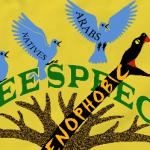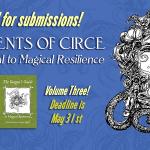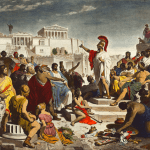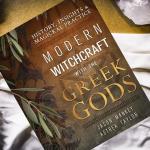First off, lets clear the air of any ideas of what this author is and is not – I am an atheist, though I prefer naturalist (as in naturalism). I also fall under the Pagan umbrella due to my nature based practices. So I am speaking from a shared perspective and not of being on one side critiquing another.
Secondly, I would like to acknowledge that there are a great many atheists who are not vocal about their worldviews and prefer to keep to themselves on the subject. This is about the more vocal members of the atheist worldview – especially those who debate in the public sphere and are out to prove everyone else is wrong. Pagans are certainly not immune to this, but there are much fewer incidences by comparison, by a long shot. And this article is to look at how that is, even though this sphere holds a lot of very different and often opposing views.
Debating remains a vital part of human discourse and shouldn’t be discouraged. It helps challenge long held beliefs that have come to be expected to be true just because that is the way it always has been – or so it appears to be from your lifetime experience. Such debates can help us shake off things that we find to be not good, and thus help us move in a better direction in life. Debates cease being good when it no longer acknowledges what the other side of the debate has to say and are essentially speaking to yourself. Even if the other side may have a valid point. As far as my own experience goes, most sides have a valid point and we mustn’t forget that the other side is human too and should avoid demonizing or belittling the person who hold views different from you. And yes, even if they started it. Its the subject that should be debated, not a person’s character. Who ever enters a debate attacking someones character does a great disservice to the debate and to themselves.
Being naturalistic myself while moving through the Pagan sphere has me rub elbows with a LOT of worldviews that greatly differ from my own, and that I simply don’t agree with for various reasons. But we maintain a human respect for one another all the while. In fact, Pagans and Atheists have worked together on a number of issues already – especially when it comes to religious rights, freedoms and particularly the separation of State and Religion. And unlike what a lot of Christians think of these two groups, we’re not out to get Christians. Its about treating everyone equally and respecting each others human rights, as opposed to having any one religion be favored over others in government. Whether it be Hindu, Muslim, Shinto, Buddhism, or Pagan. That’s it. We’re normally more interested in our own affairs and have little interest in influencing Christianity itself. Likely just as much as Christians would have interest in influencing Jainism.
There is the impression that atheists are out to oust all religious beliefs – particularly the belief in gods. How else are people supposed to interpret atheism with the denouncing religion in media debates, and putting out displays of “God Graveyards” and the like. Most public dialogue has to do with critiquing the beliefs of others and very little to do with their own. Some atheists have eventually got to the point where they state that they are weary of it and “are over it”. Pagans sometimes do the same thing too. Mostly this arises from ex-Christians who are discovering their personal beliefs and are upset with the beliefs that they once held. In a way its a personal purge of our belief systems, removing all the things we find icky. It just so happens that it usually is Christian because that was the only way we saw the world before and so inevitably that purge would involve nothing else. The same sort of things happens to anybody who changes long held beliefs from any belief to another.
After such a purge, or having been raised within the beliefs of Paganism or Atheism, the difference between Pagans and Atheists tends to be the approach to our own beliefs and how it is reflected on others. Many atheists tend to keep trudging on the conveyor belt of critiques, picking up what morsel of interesting religious tidbit that rolls on down and then go on to annihilate it to the best of their ability. Sometimes it is because it is felt that there needs to be continued, sustained opposition to the ties between religion and state in order to over come them. But often there ends up being more and more discussion on the religions themselves instead of the specific religion and state issues. Other times it seems that there is nothing else to do and so you keep doing it. Then there are those who want to move on to other things and start working on an atheist community, culture, and way of life. This has sometimes manifested in the form of atheist churches, which receives a lot of criticism within the atheist sphere. It is these atheists who are trying to construct an approach to their own worldview that have the most similarity with Pagans, and this is where Atheists can learn a lot from Pagans.
What Pagans tend to be most interested in is constructing practices and community, and maintaining a healthy community. We want a lifestyle that reflects our beliefs and thus have come up with a great many ways of doing that. It is because of the diversity of beliefs that enables such creativity and ways of expression. The fact that we hold differing beliefs goes as far as learning what those beliefs are, then going on to work together on the things we share in common. Pagans are not all Liberals, Greens, Conservative, Communists, Anarchists etc. Pagans have all of the above and then some. This makes Paganism a fantastic resource of ideas and approaches to life, you are bound to find something in common with someone here.
If you are interested in creating ceremony for different events in life you find to be important to you, look them up in the Pagan resources. Be it blog, book or interview. For any one kind of ceremony you could find 30 different approaches to it, each designed around the core held beliefs of those who do them. Most have been tweaked over the years and generations toward a formula that has found to work best in the purpose of that ceremony. Funeral ceremonies have been developed to enable the full process of grieving; Birthing and Naming ceremonies have been developed to increase the bond of child to family and community; Ceremonies of the Seasons have developed to draw ourselves and community closer to its rhythms and become better able to live according to the realities of our environment. This and more is accessible by anyone who is interested, and Pagans are usually more than happy to share. The main exception being that some practices are only learned through being a member of initiation based paths. The other main reason that sharing doesn’t occur is fear of ridicule, misinterpretation and then misrepresentation, as has happened often in media. But by showing an genuine interest by doing your homework on the beliefs of the practices that you have most interest in learning from, prior to engaging with individuals or a group to learn more, can make you a very welcomed guest to the table.
When it comes to atheists who have little interest in creating a practice for themselves or community, you can still learn a bit from Pagans. As I already mentioned, even though Pagans hold differing beliefs it usually goes as far as learning what those beliefs are, then going on to work together on the things we share in common. This approach can apply to any belief outside the Pagan sphere. A lot of people may read this and say that they already do that, but do they really? What is usually meant with that sort of response is that they respect other people and are civil to one another. Sure, but that leaves you open to a whole slew of problems. Namely unintentional disrespect through ignorance. By learning the beliefs of others enables better relationships through understanding where each other is coming from. You wouldn’t want to be unexpectedly served lamb’s head would you? This is of a similar scenario of serving a Muslim pork – neither of you would like to eat it. If you were to travel to a foreign country, you would likely like to learn the ways and culture of the people there to better operate respectively while you were there. The only difference I am suggesting is doing it where you are already, but focusing on the different beliefs that are held within your region. Where I am I already grew up learning French and English of Canada, being raised in a Quebec French family that spoke English. What I didn’t grow up learning was the indigenous beliefs of the area, which I have been rectifying in the last few years by participating in education and other retreats held by the indigenous community. I have also been learning the ancestral beliefs of various Europeans that manifest as various forms of Paganism in North America. Through this process I have avoided a great many “foot in my mouth” moments and held on to things that I ended up finding to be good things from these different beliefs, growing as a person in the process. Something that wouldn’t have happened if I just kept to my own beliefs.
















